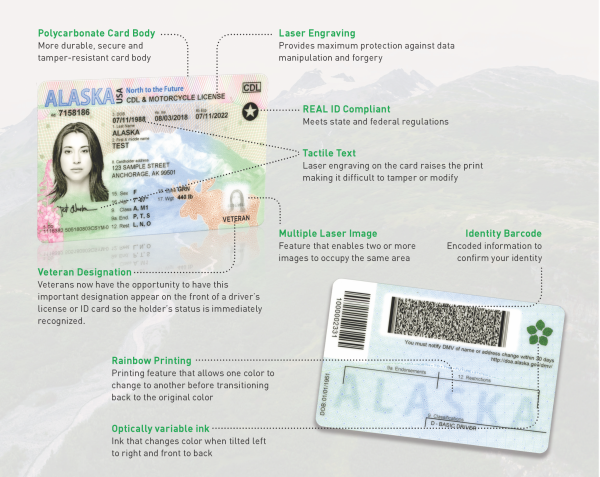
Governor Mike Dunleavy vetoed about $210 million from the state budget before he signed it on April 7.
Some of the larger vetoes include $31 million to Medicaid, $15 million to the Marine Highway System and about $4 million to pre-K grants.
Get the latest coverage of the coronavirus in Alaska
One of the smaller vetoes was to funding that would’ve helped with REAL ID implementation in rural communities.
When the Legislature passed their version of the budget, they included $150,000 that would’ve gone to the Alaska Municipal League, a statewide organization that represents most of the state’s cities and boroughs. It was meant to help rural Alaska residents get access to REAL IDs.
For any Alaskan planning on traveling by plane, a REAL ID, or compliant alternative, will be required for flights within the United States. However, many village communities don’t have access to a DMV to get one of those IDs, and it can be a hassle to get all of the required documents and travel to an area that has a DMV.
AML Executive Director Nils Andreassen says the AML wanted to use the funds to help lighten the financial load for rural Alaskans
RELATED: Bush Alaska lawmakers seek extension of REAL ID deadline due to coronavirus concerns
“AML would purchase the software and equipment necessary, would go through the training with DMV and then have staff available to travel out to communities, particularly our members off the road system,” Andreassen said.
However, that funding was part of the $210 million that Governor Dunleavy vetoed from the budget.
The state Department of Motor Vehicles has had a bumpy road when it comes to getting REAL IDs out to communities without a DMV. There was no funding for the effort. They tried soliciting donations from the public to fund village trips but then ditched that idea a couple of months in. They also developed a mobile DMV pilot program that was traveling to underserved villages. However, that came at a cost to villages, and in some cases, not everyone who applied for an ID was approved.
Now the state is pushing for rural residents to obtain acceptable REAL ID alternatives like passports, military IDs or federally recognized tribal IDs with photos.
Regardless, Andreassen says that the AML was hoping to use the funding to help more residents in cash-strapped villages comply with the new ID rules.
“Without that funding, we’ll see those local governments being in a position where they’ll have to try to find the funds to do that,” Andreassen said. “Or they’ll have to work with residents to make sure they can get to a place where they can process paperwork.”
The original deadline for getting a REAL ID was Oct. 1 of this year, but it was extended by the Trump administration to Oct. 1, 2021 due to coronavirus. State budget director Paloma Harbour says the money was vetoed because the deadline was extended.
“While future efforts will have to be made to ensure the extended deadline is met, they don’t need to be met right now,” Harbour said.
In the meantime, Andreassen says the AML will continue to work with the DMV and their local partners to get everyone up to speed on REAL IDs, though he says their large conferences may need to put on hold due to COVID-19. While the organization has most of its focus on cuts to school bond debt reimbursement and community assistance programs, he says they hope to keep REAL ID funding in the minds of lawmakers.
“We’ll want to work with everyone involved with state agencies and the Legislature and the governor’s office to make sure that rural residents and our members have the opportunity to secure the REAL ID in a way that ensures they’ve got the right access to travel,” Andreassen said.
The state DMV has estimated that about 6,700 rural Alaskans who don’t have a DMV in their community still need help with getting an ID.
Wesley Early covers Anchorage life and city politics for Alaska Public Media. Reach him at wearly@alaskapublic.org and follow him on X at @wesley_early. Read more about Wesley here.





